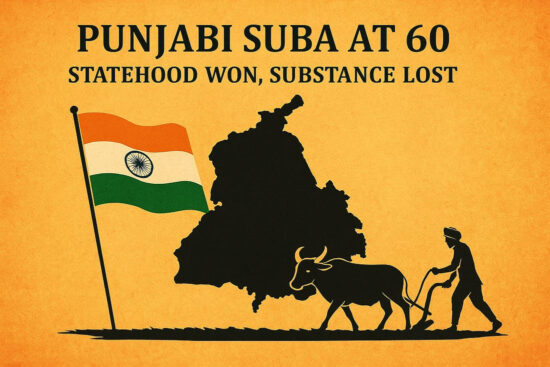 In recent years, Punjab has faced an unprecedented erosion of its rights and powers — not just in matters of governance, but also in education, culture, and identity. The state that once symbolized self-reliance and collective struggle is now witnessing a slow centralisation of authority under various national frameworks. Among these, the National Education Policy (NEP) 2020, the Central Dam Safety Act, and the Centre’s repeated attempts to alter the character of Panjab University are clear examples of how Punjab’s constitutional autonomy is being compromised. It is time for the people and the leadership of Punjab to take a strong stand — not through symbolic protests, but through concrete legislative and political action.
In recent years, Punjab has faced an unprecedented erosion of its rights and powers — not just in matters of governance, but also in education, culture, and identity. The state that once symbolized self-reliance and collective struggle is now witnessing a slow centralisation of authority under various national frameworks. Among these, the National Education Policy (NEP) 2020, the Central Dam Safety Act, and the Centre’s repeated attempts to alter the character of Panjab University are clear examples of how Punjab’s constitutional autonomy is being compromised. It is time for the people and the leadership of Punjab to take a strong stand — not through symbolic protests, but through concrete legislative and political action.
The National Education Policy 2020 was introduced without adequate consultation with the states, yet it changes the entire educational structure — from language and curriculum to governance and funding. Punjab, with its distinct linguistic and cultural heritage, cannot afford to adopt a policy that sidelines Punjabi language, regional history, and local needs. Education in Punjab must reflect its own ethos — rooted in Punjabi culture, values, and aspirations. The Vidhan Sabha has the constitutional authority to reject the NEP and frame a Punjab State Education Policy that ensures Punjabi remains the medium of instruction and that focuses on practical priorities such as agriculture, renewable energy, and diaspora studies.
If states like Tamil Nadu can refuse to implement the NEP and draft their own education policies, why can’t Punjab assert the same right? Education must empower Punjab’s youth and strengthen their connection to the land and its heritage, not make them mere participants in a centralized structure that fails to address regional realities.
Punjab’s rivers are its lifelines, yet decisions about them are increasingly taken without the state’s consent. The Central Dam Safety Act passed by Parliament undermines the state’s authority over its own dams and irrigation systems. It creates central bodies with powers to override state decisions, directly interfering with Punjab’s control over its vital water resources. This Act, if unchallenged, could have serious implications for Punjab’s economy, environment, and sovereignty over its rivers.
It is therefore crucial that Punjab passes its own Punjab Dam Safety Act in the Vidhan Sabha. Such a law should protect the state’s interests, ensure local accountability, and prevent any external interference in the management of Punjab’s water resources. For Punjab, water is not merely a resource — it is life itself, intertwined with our economy, ecology, and identity. Losing control over it would mean surrendering our future.
The controversy over the Centre’s recent attempt to restructure Panjab University once again revealed the ongoing pattern of encroachment on Punjab’s rights. Though the decision was rolled back after widespread outrage, the episode made it clear that the Centre intends to dilute Punjab’s influence over one of its most historic and prestigious institutions. Panjab University is not just a university; it is a symbol of Punjab’s intellectual and cultural self-respect, built through the sacrifices and vision of Punjabis after Partition. Any move to alter its structure without Punjab’s consent is an attack on that legacy.
The #SavePanjabUniversity movement must therefore grow into a larger people’s campaign, just like the Farmers’ Movement. It should not remain limited to students and professors — it must become a collective struggle to defend Punjab’s educational sovereignty and protect its institutions from external control. When Punjabis unite across political and social divides, they have the power to change the course of history, as the farmers proved.
Now, the same unity is needed again — to reclaim our constitutional powers and to assert our rightful place in the Indian federal structure. Punjab must lead by passing its own Education Policy, enacting a Punjab Dam Safety Act, and protecting Panjab University through a strong legislative and social movement. These steps will not just safeguard Punjab’s interests but will also set an example for other states to stand up for their rights.
Punjab’s struggle today is not merely political — it is a fight for dignity and self-determination. Whether in the field of education, water, or higher learning, the central question remains: will Punjab control its own destiny or continue to be dictated by forces far from its soil? History will remember what path we choose today.
It is time for clarity, courage, and collective resolve. Just as the farmers’ movement united Punjabis across borders and backgrounds, the call to Save Panjab University and assert Punjab’s legislative autonomy can once again bring the state together in defense of its future.
#SavePanjabUniversity | #PunjabEducationPolicy | #PunjabDamSafetyAct | #PunjabRights